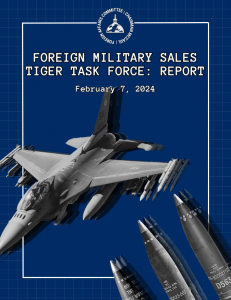Chairman McCaul Praises Release of Foreign Military Sales TIGER Task Force Report
Washington, D.C. — Today, the Foreign Military Sales (FMS) Technical, Industrial, and Governmental Engagement for Readiness (TIGER) Task Force, convened by House Foreign Affairs Committee Chairman Michael McCaul (R-TX), and led by Rep. Mike Waltz (R-FL) and Rep. Seth Moulton (D-MA), released its report identifying legislative improvements to the State Department-led FMS process. The Task Force also includes Rep. French Hill (R-AR), Rep. Mike Garcia (R-CA), Rep. Rich McCormick (R-GA), Rep. Young Kim (R-CA), and Rep. Jason Crow (D-CO). The report convened key partners across the United States government, defense industry, and foreign governments to identify major hurdles which slow the FMS process, forcing America’s partners and allies to turn elsewhere for defense needs. The report comes as delays in the FMS process imperil the capacities of America’s allies and partners—such as Taiwan, Israel, and Ukraine—to respond to threats in their own neighborhoods.
Click here or above to view the report.
“America’s partners and allies rely on the United States to provide consistency and stability for their defense needs,” stated Chairman McCaul. “Unfortunately, America’s defense industrial base has not kept pace with the evolving security needs of our allies and needs serious reform. Threats posed by bad actors like Vladimir Putin, the Chinese Communist Party, and Iran-backed terror groups threaten America’s partners and allies around the world who need a steady partner. With the reforms to America’s Foreign Military Sales process included in this report, America can be that partner and promote a stronger defense posture around the world.”
“In an era of great power competition with China and the War in Ukraine, I’m proud of the bipartisan work that went into this task force as a first step towards modernizing our foreign military sales process. As we’ve learned with recent conflicts, it’s critical the U.S. help arm our partners and allies like Taiwan in advance, and we hope these reforms will help deter future aggression,” said Rep. Mike Waltz.
“America’s allies and partners are our first line of defense against adversaries across the globe. As the world grows more dangerous and threats grow more complex, it is in our own interest, and theirs, to deliver new military capabilities faster and much more efficiently. Our obligation as a partner is to speed up the clunky, bureaucratic foreign military sales process—and this task force has outlined a roadmap for Congress to help do just that,” said Rep. Moulton.
Key Findings:
- Many more arms sales cases are subject to congressional review now than when the Arms Export Control Act was first signed into law in 1976. Congressional review is one of the longer processes for a complicated FMS case. The threshold values for a sale to require congressional review has not been adjusted for inflation for over two decades.
- Senior Department of State and Department of Defense (D0D) officials are not directly accountable for significant delays in FMS cases, creating a lack of urgency to speed the process up.
- The Department of Defense does not consistently value the strategic benefit of sharing major defense articles with our allies. This produces decisions on contracts that deprioritize exportability and results in insufficient prioritization of getting FMS cases on contract.
- FMS decisions are not always made in the context of the full global security assessment, and there is no common operating picture for the FMS process across the DoD, State, Congress, Industry, and our allies and partners, leading to confusion and inefficiency.
Recommendations:
- Adjust the thresholds of Congressional notification for inflation.
- Hold senior policy officials at DoD and State accountable for long-running and high-value FMS cases, including requiring certification about not using Presidential Drawdown Authority.
- Better resource the Special Defense Acquisition Fund.
- Ensure that partner negotiations for FMS and other arms sales incorporate the U.S. assessment of the regional threat environment.
- Ensure that exportability is not eliminated from contracts without review and certification.
- Provide information transparency to DoD, State, Industry, and partners about cases.
- Incentive sales of innovative defense technologies, even if an item is not an existing program of record.
###
